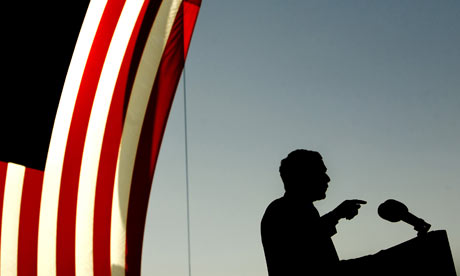
Glyn Maxwell is an English poet, verse-playwright, novelist and screenwriter, who studied at Boston University under Derek Walcott, and settled in the USA in 1996. Much of his originality lies in the way he takes off from "traditional" form, and invigorates it with an intriguing transatlantic double-vision and a fusion of demotic styles. Like Thom Gunn before him, and, in a very different way, Gunn's mentor WH Auden, Maxwell gives us good reason to celebrate, artistically, at least, the "special relationship".
This week's poem, "Martial Diptych" is immediately eye-catching, with its long-line/short-line stanza structure, use of capital letters and Roman numerals, and its recto-verso layout (see the volume where it first appeared, the splendidly sombre 2008 collection, Hide Now) As in some kind of imperial arena, the architecture is stark and intimidating. The gladiators seem to be limbering up.
Rhythm, of course, comes before layout, and works its governance through sound. Here, the strong marching beat immediately asserts itself in the first line's dense iambic monosyllables ("By stock-still flags"), reinforced by the following anapaest, with its flourish of martial drum-beats (ta-ta-tum). Each stanza's first line makes sense metrically only when it is rolled over into the second, curtal line. A conventional New Formalist could have written: "By stock-still flags on the hottest day recorded,/ He delivered a rousing speech to about six hundred." And how dull would that have sounded!
The unexpectedly premature line-break is an inspired rhythmic device. It's like the moment when a military parade halts and turns, with an abrupt, short pause that heightens the crash of stamping feet when the drill resumes. This kind of innovation demonstrates the possibilities traditional prosodic structures continue to hold. The paired, hard-sounding rhymes and half-rhymes pack further, well-timed punches.
This is a political poem, shadowed by 9/11 and its repercussions. "The six-hundred" inevitably remind us of the horrible, unnecessary slaughter commemorated in Tennyson's "The Charge of the Light Brigade". We know before the headlines tell us that the enthusiastic troops are being sent to death by mistaken objective.
Political poems that apply the lyric poet's tactics evoke our emotional response, at least when they're as skilfully handled as this. The cleverly-integrated "pathetic fallacy" gives nature a strong supporting role, and the weather's relentless heat (provoked by previous ill-targeted wars?) suggests a palpable "hotting-up" of a president's vast ambition and an army's fatal collusion. The climate is literally murderous.
Maxwell's dictator is not after "perfection, of a kind", unlike Auden's more complex figure in the memorable "Epitaph on a Tyrant". He seems more obviously insane. And he's the president! The phrases "war on thunder" and "war on water" must be meant to remind us of another absurd phrase, used by a real president not so long ago, with disastrous results.
As the poem progresses, it reveals that the speaker is looking back from the dystopian aftermath of the wars. He used to be a news-man and his press-cuttings illustrate the president's escalating objectives. The end of the poem suggests, again, a climate gone mad. The fierce blue sky of the first scene has faded, and the horizon is whitening, as if in horror, between those pathetic twirling and falling caps. A new maximum temperature has been recorded. The rest is the history we hardly dare imagine. Our own?
"Martial Diptych" is reprinted with kind permission of the author and of Picador Poetry, an imprint of Pan Macmillan, London, UK.
Martial Diptych
I
By stock-still flags on the hottest day
Recorded,
He delivered a rousing speech to about six
Hundred.
At the end of his speech the caps would be hurled
Skyward.
The sky was the blue of the blue sky on a
Postcard.
There it all is in a black-and-white shot in the
Paper,
Depicting the memorable scene at his alma
Mater.
The sky is the grey it would turn and, in capitals
Under:
PRESIDENT RALLIES THE TROOPS FOR THE WAR
ON THUNDER.
II
PRESIDENT RALLIES THE TROOPS FOR THE WAR
ON WATER
I see in my scrapbook. I used to be a
Reporter.
The bleachers were pegged to the sand, and about six
Hundred
Were waiting to hurl their caps, and nobody
Wondered
Where was the ocean gone. The highest
Recorded
Temperature rose and twelve hundred hands
Applauded
Everything. I looked at the sharp
Horizon
Through twirling and falling caps and I saw it
Whiten.
Copyright © Glyn Maxwell, 2008.

